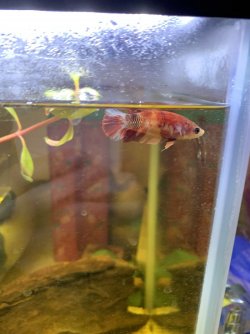Hi everyone,
Sorry to bother you. My female Betta just killed my cardinal tetra and now she’s ill. I introduced 4 cardinal tetras into her 10 gallon tank thinking it would be okay, my LFS said it would be fine, but within an hour or so of putting them in the tank she attacked one of them. She's quickly gone downhill from here, she is floating to the top and resting at the surface on her side, she is also struggling to swim. I would usually only research these symptoms alone, but its the facts it happened so shortly after her killing it that's worrying me.
Thank you and hopefully someone can help
Sorry to bother you. My female Betta just killed my cardinal tetra and now she’s ill. I introduced 4 cardinal tetras into her 10 gallon tank thinking it would be okay, my LFS said it would be fine, but within an hour or so of putting them in the tank she attacked one of them. She's quickly gone downhill from here, she is floating to the top and resting at the surface on her side, she is also struggling to swim. I would usually only research these symptoms alone, but its the facts it happened so shortly after her killing it that's worrying me.
Thank you and hopefully someone can help

